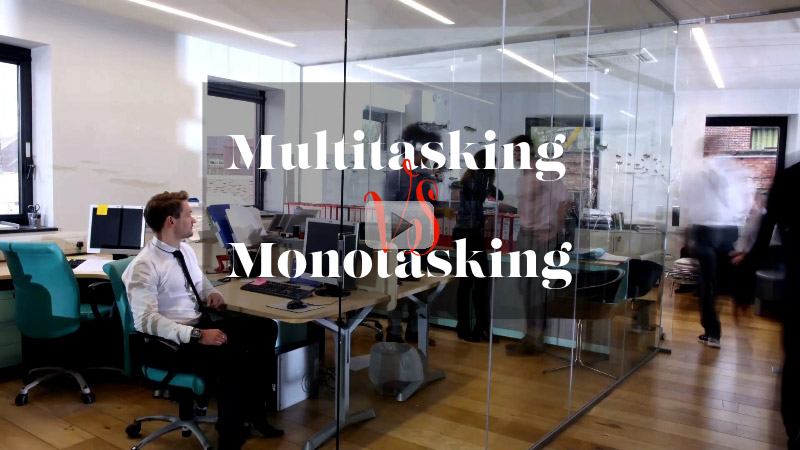The Truth About Multitasking

- Sep 27, 2023
The Truth About Multitasking
The Truth About Multitasking: Debunking the Myth and Revealing the Psychology
Multitasking - it's a term we've all heard and likely used to describe our busy lives. It's the art of doing more than one thing at once, and it often feels like a necessary skill in our modern, fast-paced world.
But is it as effective as it seems? Let's dive into the multitasking world, exploring what it is, how it works, and whether it lives up to its reputation as a productivity booster.
The myth of multitasking: why it doesn't increase productivity
It's disappointing to reveal that psychology has concluded that multitasking isn't the productivity powerhouse it appears to be. The idea of accomplishing more in less time is undeniably tempting, but according to scientific research, it might not be the game-changer we hoped for.
Research in psychology and cognitive science has consistently shown that multitasking is not as productive as it might initially seem, and it can often be considered a myth in boosting productivity.
Here are some critical reasons, based on research, why this method is less effective than it appears:
1 Reduced Efficiency: When we switch between tasks, our brains incur a "switching cost" as we need to refocus our attention and cognitive resources. This results in a decrease in overall efficiency.
2 Increased Errors: Multitasking can lead to an increase in errors and a decrease in the quality of work. Splitting your attention between multiple tasks can make catching mistakes and fully engaging in each task difficult.
3 Decreased Focus: Multitasking can hinder our ability to concentrate intensely on one task, reducing our ability to comprehend and solve complex problems.
4 Memory Impairment: Cognitive psychologists have found that dividing attention among multiple tasks can impair our ability to effectively encode and retrieve information from memory.
5 Stress and Mental Fatigue: Constantly shifting between tasks can lead to increased stress and mental fatigue, ultimately diminishing long-term productivity.
While there are some exceptions, such as simple and automatic tasks that can be combined effectively, the consensus among psychologists is that multitasking is generally less productive than focusing on one task at a time.
The cognitive limitations of the human brain when it comes to multitasking
Multitasking taxes the brain's attentional and executive control systems, reducing neural efficiency, increasing cognitive load, and interference between tasks. Over time, this can lead to neural fatigue and potentially long-term cognitive effects.
The illusion of multitasking relies on this basic principle: Our brains are switching between tasks rapidly instead of doing them simultaneously
Recognizing these limitations is crucial for individuals looking to maximize their productivity and cognitive performance in various aspects of life.
What to do instead?
The recommended approach is to practice single-tasking or what is often referred to as "monotasking." This approach involves focusing your attention on one task at a time. Here are some basic strategies for effective single-tasking:
- Prioritize Tasks: Start by identifying your most important and high-priority tasks. Focus on completing one task before moving on to the next.
- Time Blocking: Allocate specific blocks of time for individual tasks or types of work. During these dedicated blocks, commit to working on that task exclusively.
- Eliminate Distractions: Minimize distractions in your workspace. Turn off notifications on your devices, close unnecessary browser tabs, and create a quiet, focused environment.
- Set Clear Goals: Define clear objectives for each task. Knowing what you need to accomplish can help you maintain focus and avoid drifting into unrelated activities.
- Single-Task with Full Focus: Give it your full attention when working on a task. Avoid the temptation to switch to other tasks or check your phone.
While it may seem counterintuitive in a fast-paced world that often values busyness, the evidence supports the benefits of single-tasking for achieving meaningful and effective results.
In a world that often glorifies multitasking as the ultimate productivity hack, it's essential to remember that the brain has limitations. Focusing our attention on one task at a time can lead to higher-quality work and a more balanced, less stressed life.
Search News Articles...
Recent Articles

Keywords no longer as visible in GSC
- Jan 12 2026
- /
- 218

Unique Web Systems Matter in a World of Sameness
- Dec 26 2025
- /
- 159

Most AI Websites Fail to Rank
- Nov 18 2025
- /
- 392

Sitemap.xml Best Practices
- Oct 14 2025
- /
- 1947

Fake Reviews on Google My Business
- Oct 07 2025
- /
- 607

Sending Emails from Code
- Sep 17 2025
- /
- 679

US Tariff Shifts Undermining eCommerce
- Sep 05 2025
- /
- 842

Small Business Success Formula
- Aug 23 2025
- /
- 621

Do Strong CTAs Help or Hurt Your Website?
- Jul 31 2025
- /
- 843

AI Crawlers vs Search Crawlers
- Jul 04 2025
- /
- 1134
View All News Articles
Categories
A Gold Coast SEO and Web Developer
